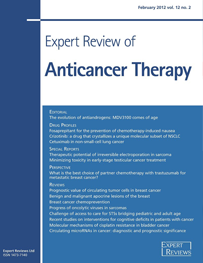Report Library
All Reports
Aromatase Resistance and Palbociclib for Breast Cancer
April 01, 2014
Clinically, there are two distinct types of aromatase inhibitor (AI) resistance, namely
acquired and innate resistance. Because the underlying mechanisms of these two types of
resistance may not be mutually exclusive, strategies to tackle these resistances may not be
effective when used interchangeably. Activation of growth factor receptor pathways is the
hallmark of acquired AI resistance. These pathways can be targeted either at the cell
surface receptor level or their downstream signaling cascades. Currently, everolimus in
combination with exemestane represents a new standard of care for patients progressing
on non-steroidal AIs. HDAC inhibitors have also shown promising results For innate
resistance, the combination of fulvestrant and AI in the front line setting represents a new
treatment option, particularly for patients who present with de novo metastatic disease. A
Phase III trial is currently ongoing to evaluate the benefit of CDK 4/6 inhibitor, palbociclib, in
the first line setting in combination with AI.
Expert Review is a leading publisher of commentary and analysis in modern healthcare. Expert Review journals are published according to industry-leading standards of peer review, presentation, speed of publication, online functionality and author service. For related Expert Reviews please visit: http://informahealthcare.com/page/ ExpertReview.
BioMedTracker will be offering KOL Reports, Physician Pulse Surveys, Expert Review and Expert Opinion articles through 2014 for purchase a la carte, or access to all reports and surveys can be purchased as a subscription to KOL Insight. For more information on KOL Insight subscription, please email BioMedTracker or call BioMedTracker Client Services at (858) 200-2357.
To access the Expert Review of Anticancer Therapy report, click the link at the top of the page.
For our disclosures, please read the BioMedTracker Research Standards.
Expert Review is a leading publisher of commentary and analysis in modern healthcare. Expert Review journals are published according to industry-leading standards of peer review, presentation, speed of publication, online functionality and author service. For related Expert Reviews please visit: http://informahealthcare.com/page/ ExpertReview.
BioMedTracker will be offering KOL Reports, Physician Pulse Surveys, Expert Review and Expert Opinion articles through 2014 for purchase a la carte, or access to all reports and surveys can be purchased as a subscription to KOL Insight. For more information on KOL Insight subscription, please email BioMedTracker or call BioMedTracker Client Services at (858) 200-2357.
To access the Expert Review of Anticancer Therapy report, click the link at the top of the page.
For our disclosures, please read the BioMedTracker Research Standards.
| Indications Covered: | Breast Cancer |
